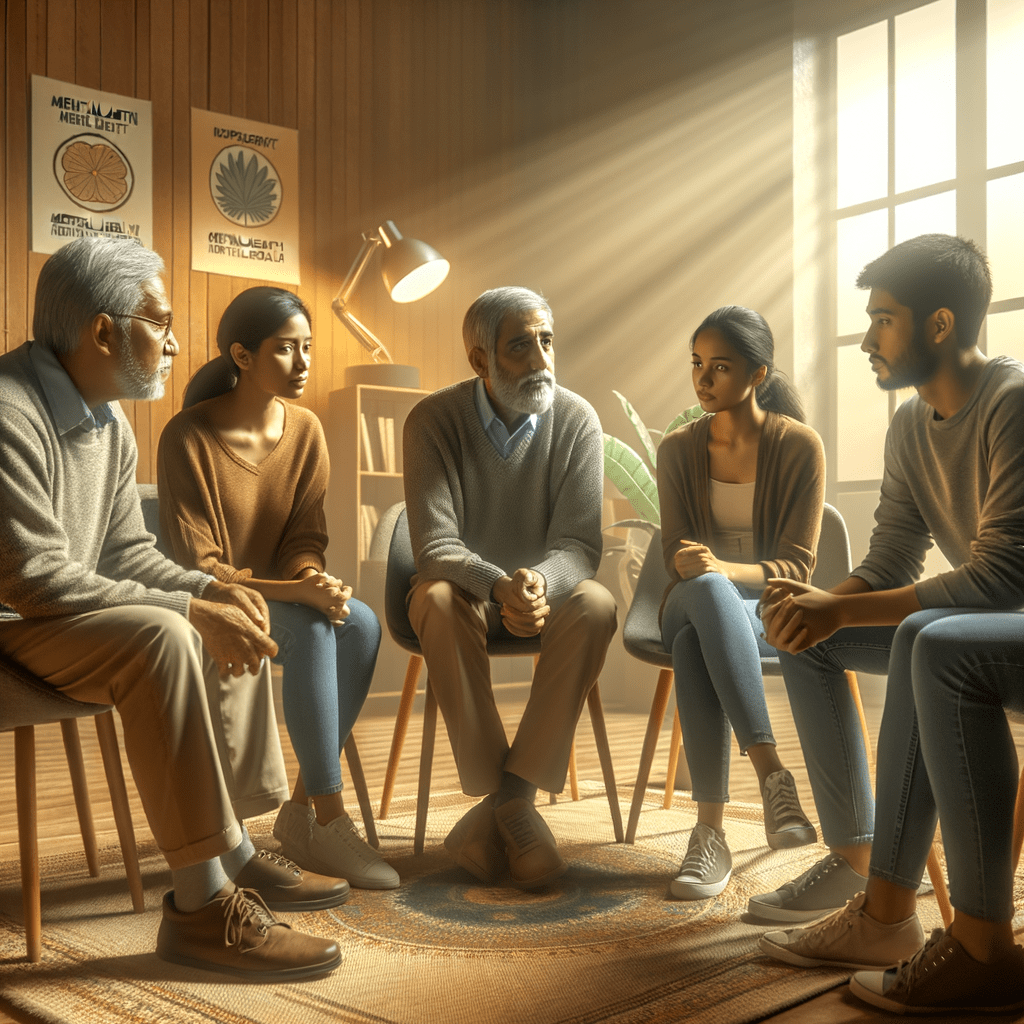There’s this cozy little nook in our lives that nobody seems to mention, a quiet space where our feelings and thoughts swirl like they’re doing a stormy dance. It’s that complicated place called mental health—a subject that has, quite frankly, spent way too much time in the dark. And honestly? Talking about our mental well-being isn’t just a nice idea; it’s crucial. It’s like cracking open a window in a really stuffy room, letting in some much-needed fresh air and sunlight to chase away the shadows. I’m nudging, no, I’m practically begging everyone to grab an imaginary loudspeaker and start chatting about both emotional and mental well-being.
Now, you’d think because mental health affects literally everyone, it would be a hot topic, right? But often, it gets left in the dust like an afterthought. I mean, why are we whispering when we could be talking openly? Mental health is kind of like an ugly sweater we hide deep in our closets—it doesn’t go away just ’cause we ignore it. It sticks around, growing into this big, tangled mess that can seep into every corner of our lives. And seriously, why shouldn’t a conversation around mental health be as easy as talking about the weather or what kind of pizza we love?
Ever had one of those days where waking up feels like carrying a ton of bricks, with gloom trailing you all day like an unwelcome fog? Been there, trust me. In those gloomy moments, simply chatting with someone can feel like a bit of magic, lifting some of the weight. It’s like cracking a smile during a serious movie—it might not change everything, but it lightens the mood a bit. Life’s a roller coaster, up one minute, down the next; sharing our experiences can make it a little less of a wild ride.
I’ll admit, sometimes, when I’m feeling bold, I dive into a mental health convo out of the blue, just to see what happens—like a mini social experiment to break down the awkward walls people put up. It’s risky business, sure, but it usually leads to deeper, more meaningful conversations that strengthen connections.
Picture this—each conversation about mental health as a tiny step forward: toward understanding, empathy, and finally breaking the taboo. Imagine a world where saying, “I’m not okay,” isn’t met with judgment but with genuine kindness. It’d be like finally finding your place in this big, confusing puzzle we call life. Our mental health influences how we think, feel, and act—it’s pretty darn important.
The Silence That Needs Shattering
Growing up, a lot of us got the not-so-subtle hint that mental health struggles were best kept under wraps. Maybe you heard “get over it” thrown around a bit too casually. But keeping quiet? Yeah, that doesn’t really help anyone. I’ve learned from personal experience and from hearing others’ tales that hoarding our struggles inside only turns them into big, heavy monsters. But letting them out into the open—like seeing sunshine after a super long winter—works wonders. I’ve seen it happen—the relief that spreads over people’s faces once they share their stories, like taking off a tight pair of shoes at the end of the day.
We hear a lot about “cutting through the shame,” which might sound dramatic, but it’s true. The stigma of appearing vulnerable—or heaven forbid, being labeled ‘unstable’—can absolutely lock us up in our minds.
If we don’t create places for these conversations, society will keep pushing the idea that mental health is a secret to keep, not something to chat about openly. But come on, isn’t there a serious need to talk about it? Viewing mental health as a daily matter, not some separate issue, is so important. If not, we’re just helping a cycle of silence and stigma keep spinning.
Forging a Culture of Understanding
Wouldn’t it be great if family dinners included chats about mental health, just as easily as they include talks about work, school, or the latest political drama? With those kinds of conversations, empathy flows like an endless river—bonding us in profound, human ways.
Every chat moves us closer to breaking the stigma that stops us from seeking help or offering support to others. Empathy leads to compassion, and compassion leads to healing—a straightforward recipe, yet society seems to miss it so often.
One time, a friend shared their rocky path through episodes of depression, and I found myself nodding, silently connecting. What they didn’t realize was that they were helping me, too. It’s amazing how words can plant understanding, turning struggles into a shared experience instead of a lonely one.
This connection? It’s magical. Imagine living where no one hesitates to say they need help, and mentioning a therapist doesn’t bring awkward pauses. When we share these experiences, we move from dark corners into a society ready to embrace healing and learning.
Normalizing the Hard Conversations
Let’s be honest. Getting comfortable with mental health talks doesn’t happen overnight. It requires effort and practice to make it as easy as chatting about physical health or the latest must-watch show.
I remember talking about anxiety with a coworker over coffee—of all things! He tentatively began sharing his struggles with panic attacks, initially as uncertain as a cat testing water. But as we talked, that awkward barrier started to crumble, and it became easier.
At first, I was nervous about how much I should share about my own struggles. That awkward feeling niggles at us, doesn’t it? “Am I oversharing?” But word by word, that tightness loosened. It just turned into another conversation, albeit one with a significant punch as we found comfort in each other’s stories. That right there—that’s what normalizing means to me.
It feels overwhelming when you stop to think about it—all the layers of stigma to peel away. It’s a job for everyone, making these talks as normal as lemon in tea, so they seep into everyday life.
Why Representation Matters
Representation is a big deal. It shines a light for those wandering in the shadows, showing what’s alright and acceptable. In media, books, or art, seeing mental health openly talked about can uplift those on the edges of mainstream narratives.
When movies show characters grappling with mental health issues or public figures speak up without shame, it sends a quiet but huge message—it’s okay to talk about it. Sure, stereotypes don’t vanish overnight, but every step forward adds some color to a once gray world.
Realistic representation in media matters, too; it’s not about some cure-all solution but reflecting true, relatable experiences.
Tales of Hope and Resilience
Amidst all this chatter, there’s a thread of resilience weaving through stories of those managing mental health struggles. These aren’t sad tales but examples of perseverance and survival. They don’t sugar-coat reality but reveal possibilities.
These stories—where a friend’s voice or therapy brings light—remind us that even the darkest path can lead to hope.
Breaking Generational Chains
Let’s chat about how mental health stigma can pass from one generation to the next like that old, unwanted family keepsake. If we start these dialogues, we break the cycle that keeps mental health in the shadows.
My parents didn’t talk much about mental health. “Tough it out” was the motto. But things can, and do, change. A big shift happened for me when my dad started talking about his anxieties—not deflecting with humor but addressing it honestly.
Creating these multigenerational conversations means breaking chains and building bridges for future generations, nurturing an environment open to dialogue instead of locked in silence.
Cultivating Safe Spaces
We need to create safe spaces—for real, judgement-free conversations about mental health. Picture places filled with authenticity, where topics roam freely, and hope swells.
We need spaces where discomfort’s okay—all groups, schools, workplaces should naturally welcome these conversations. Supporting someone should be normal, not risky. Creating such spaces is progress—a symbolic shift toward fostering well-being.
An online group I joined? Initially, it made me as nervous as a cat in a room full of rocking chairs, but the shared understanding there was transformative. It proved how crucial supportive environments are for broader, meaningful change.
Embracing Imperfection
In our journey, let’s not forget to embrace imperfection. It’s this messy, wonderful part of being human that binds rather than separates us.
The talks we have—sometimes filled with uncertainty—form the whimsical quilt of life’s experiences. By speaking about mental health, every shared experience crafts a more empathetic world.
Let’s break those old walls of silence with conversations about mental health—a testament to strength through vulnerability, turning whispers into the kind of thoughtful noise that makes meaningful change.
Talking about mental health matters more than ever. So let’s ditch the whispering and speak out, rallying together in this ever-expanding embrace of our collective humanity.
—
This is me, in all my imperfect, chatty human ways, adding my two cents to the mental health conversation. No perfect words, just some thoughts hoping to nudge openness forward every day.














